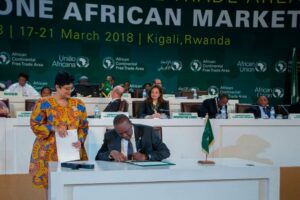
Predictable Rules on Investment Key to Realizing the AfCFTA Dream
Recently, I wrote on the investment protocol that underlines the African Continental Free Trade Area (AfCFTA) implementation highlighting the need for sustainable investment protection, balanced interest, and efficient dispute resolutions. This highlights the need and importance of predictable rules on investment under the AfCFTA in driving increased regional integration and making Africa more attractive for business from within and outside Africa. Stronger and more predictable rules on investment can expand commercial opportunities, increase employment and government revenues, and opportunities in transforming African economies. While it is not lost on farmers of the trade agreement on the importance of such roles, it is necessary for other stakeholders, including citizens and governments of host investment nations to understand their needs.
Predictable rules are a necessity in creating a conducive environment for investors even as the investment protocol seeks to drive increased intra-African trade. This is a critical element in providing certainty and transparency in investment regulations which will allow the framework to instill confidence in both domestic and foreign investors for increased capital inflows into the continent. Businesses are able to make informed decisions and plan for the long term with clarity on property rights, repatriation of profits, dispute resolution mechanism, and regulatory frameworks. This predictability is necessary for encouraging increased investment inflows, facilitating business expansion, and promoting economic growth across the continent through the AfCFTA.
Foreign direct investment, domestic and otherwise, is crucial for Africa’s economic development agenda and the realization of the AfCFTA dream of lifting 30 million people out of extreme poverty. Predictable rules on investment will therefore serve as a magnet for foreign investors seeking increased stability and security of their capital. When hosts inspire confidence in investors through legal and regulatory frameworks, they are likely to see an increased commitment to resources that enhance technology transfer, creation of jobs, and skills development for the continent. Thus, by establishing predictable rules on investment, the AfCFTA can position Africa as an investment destination with increased FDI inflows and stimulate economic growth while enhancing competitiveness.
Investments in Africa have always carried inherent risks as an emerging market. The lack of predictable rules and uncertain investment environments often deter investors which limits capital inflows and hinders economic progress. This establishes clear and predictable rules on investment allowing the AfCTA to mitigate these risks and establish a more stable environment for businesses to thrive. Africa has significant uncertainties associated with changes in policies, regulations, and legal frameworks that have contributed to the failure of past free trade area agreements. Thus, predictability in investment rules is necessary for inspiring investor confidence toward making long-term commitments within the continent.
Boosting intra-African trade is a crucial component of the AfCFTA in driving sustainable economic development and growth and solving perennial challenges such as hunger. Thus, predictable rules on investments are essential if the AfCFTA is to encourage domestic businesses to expand and invest across borders. This is driven by an assurance of investments being protected and business people being treated fair and allowed to compete within other African states which can encourage exploration of opportunities beyond home markets. Having predictable rules foster a sense of trust and promote a level playing field which would enable African businesses to harness the potential of the continental market and contribute to increased economic integration.
The failure of regional trading blocks in Africa has often been underlined by the lack of harmonized regulatory frameworks with nation-specific interests often competing with agreed free trade area priorities. Predictable rules on investment under the AfCFTA can drive the harmonization of regulatory frameworks and limit the capacity of individual nations, especially large economies such as South Africa, from disadvantaging small markets. The AfCFTA seeks to align trade and investment regulations in eliminating barriers and enhancing regional integration. Thus, consistent and transparent rules would streamline investment processes, harmonize standards, and reduce compliance costs in driving foreign direct investment and intra-trade. Here, African nations can realize increased cross-border investments, reduce bureaucratic hurdles, and encourage partnerships and collaboration among nations in driving better economic outcomes. The AfCFTA-driven rules therefore as a catalyst for regulatory convergence, establishment of a seamless investment landscape, and attracting both local and international investors.
Foreign Direct Investment in Africa has often been slowed by investor-state disputes, especially with changing government administrations and regulatory frameworks. The case of Cortec Mining, Cortec Limited, and Stirling Capital Limited in which the government of Kenya withdrew a mining license in 2013 following a change of guard is an illustration of such occurrences. Investor-state dispute resolution mechanisms that lower costs, and time, and enhance efficiency are critical in ensuring the protection of investments in the event of disputes and will play a critical role in driving intra-African trade. Thus, implementers of the AfCFTA framework have to focus on establishing clear, transparent, and reliable arbitration frameworks to drive investor confidence and provide predictable mechanism for resolving investment disputes. With this, the continent will benefit from increased trust between investors and host nations in mitigating investment risks and create overall stability in the investment environment.
As Africa embarks on the AfCFTA journey, predictable rules on investment must be at the forefront of its agenda. By creating a conducive investment environment, attracting FDI, mitigating risks, promoting intra-African investment, enhancing regulatory harmonization, and strengthening dispute resolution mechanisms, the AfCFTA can realize its dream of economic integration and sustainable growth. The AfCFTA’s success relies on the commitment of African nations to establish clear and transparent rules that instill confidence in investors and drive economic transformation. By prioritizing predictable rules on investment, Africa can unlock its vast potential and create a prosperous future for its people and the continent as a whole.
Muoki Musila is an Kenyan based economist. These are the writer’s own opinions and do not necessarily reflect the viewpoints of Liberty Sparks. Do you want to publish in this space? Contact our editors at info@libertysparks.org for further clarification.



